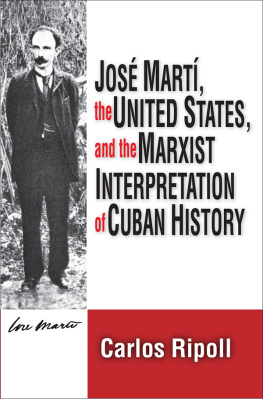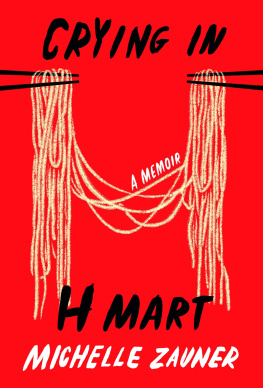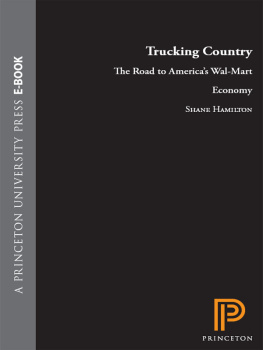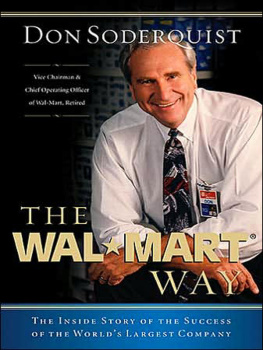Thank you for buying this ebook, published by NYU Press.
Sign up for our e-newsletters to receive information about forthcoming books, special discounts, and more!
Sign Up!
About NYU Press
A publisher of original scholarship since its founding in 1916, New York University Press Produces more than 100 new books each year, with a backlist of 3,000 titles in print. Working across the humanities and social sciences, NYU Press has award-winning lists in sociology, law, cultural and American studies, religion, American history, anthropology, politics, criminology, media and communication, literary studies, and psychology.
WAL-MART WARS
NEW YORK UNIVERSITY PRESS
New York and London
www.nyupress.org
2013 by New York University
All rights reserved
References to Internet websites (URLs) were accurate at the time of writing.
Neither the author nor New York University Press is responsible for URLs that
may have expired or changed since the manuscript was prepared.
LIBRARY OF CONGRESS CATALOGING-IN-PUBLICATION DATA
Massengill, Rebekah Peeples, 1975
Wal-Mart wars : moral populism in the twenty-first century / Rebekah Peeples Massengill.
pages cm
Includes bibliographical references and index.
ISBN 978-0-8147-6333-9 (hbk. : alk. paper)
ISBN 978-0-8147-6334-6 (pbk. : alk. paper)
ISBN 978-0-8147-6335-3 (e-book)
ISBN 978-0-8147-6336-0 (e-book)
1. Wal-Mart (Firm) 2. Retail trade. 3. MarketingMoral and ethical aspects. 4. Marketing
Political aspects. I. Title.
HF5429.M337 2013
658.87dc23
2012040760
New York University Press books are printed on acid-free paper,
and their binding materials are chosen for strength and durability.
We strive to use environmentally responsible suppliers and materials
to the greatest extent possible in publishing our books.
Manufactured in the United States of America
c 10 9 8 7 6 5 4 3 2 1
p 10 9 8 7 6 5 4 3 2 1
ACKNOWLEDGMENTS
The research that culminates in this book has unfolded over several years, and that journey has brought me into a series of intellectual communities where my scholarship has been challenged, enriched, and improved. As I always attempt to convince my students, the isolated ivory tower image of scholarship is nothing more than an illusion; research is a collaborative enterprise in which scholars are perpetually engaged with one another in intellectual conversation. I am quite fortunate to be able to thank a multitude of people for their contributions to this book.
In its early form, this project benefited from the advice and mentorship of several members of the Department of Sociology at Princeton University. Bob Wuthnows interest in and encouragement of my research have been ongoing, and his presence as both scholar and mentor has enriched this project from the start. Conversations with Miguel Centeno shaped this project in a host of ways, and his challenging questions have made my arguments more cogent and, I hope, more convincing. Viviana Zelizer offered vital feedback throughout this project, and I am honored to be able to address even a small portion of the research agenda she has pioneered in economic sociology. At NYU Press, Ilene Kalish was a faithful editor whose enthusiasm for this project helped to shepherd the book from start to finish. Betsy Wells Stokes provided expert editorial assistance in the final stages of revision.
This book also owes a debt of thanks to a number of institutions and individuals who provided financial resources and other forms of assistance. I could not have completed this research without the financial support I received from Princeton Universitys Center for the Study of Religion during 20052008. Anita Kline and Barbara Bermel at CSR deserve special thanks, as do Sarah Chen, Whitney Downs, Greg Kennedy, Amirah Mercer, and Naomi Sugi for the research assistance they provided in working with various documents through the processes of coding and analysis. Portions of this research were also funded through the John Templeton Foundations support of the Cognition and Religion Initiative at CSR. Later stages of research and writing were supported by the Princeton University Committee on Research in the Humanities and Social Sciences, as well as a Faculty Research Support grant from Swarthmore College. In addition to financial resources, Princetons Center for the Study of Religions Cognitive and Textual Methods seminar proved pivotal in shaping both the research questions I eventually embraced in this project and the theoretical approach I use to investigate them. CSRs Religion and Public Life Seminar similarly provided a valuable forum in which to present portions of this project in various stages of completion.
A wealth of colleagues provided various forms of useful feedback at different stages of my research and writing. Ruth Braunstein, Chris Close, Mitch Duneier, Hilary Levey Friedman, Jim Gibbon, Conrad Hackett, David Kozo, Michael Lindsay, Carol Ann MacGregor, Noelle Mol, Caitlin Mollison, Christine Percheski, Amy Reynolds, Rob Smith, Judy Swan, Chris Wildeman, Amanda Irwin Wilkins, and Marian Wren deserve special recognition for helpful conversations about various dimensions of this project along the way. At Swarthmore during 20112012, the Junior Faculty Writing Group offered useful feedback on portions of the manuscript, with special thanks going to Rachel Buurma, Laura Holzman, Nina Johnson, Min Kyung Lee, Ayse Kaya Orloff, Mike Reay, and Eric Song.
My work has also been strengthened by the ongoing conversations about Wal-Mart, language, politics, and consumption that have been part of my academic life for the past four years. During this time Ive had the opportunity to teach bright and inquisitive students at both Princeton and Swarthmore in my Wal-Mart Nation and Discourse and Democracy courses. I wont risk trying to thank you all by name, but trust that if you are reading these acknowledgments, then you know who you are! In what I hope is the greatest testament to my students and the strength of their work, I have cited some of their research in the manuscript that follows. Introducing students to the methods of social science research while wrestling with the deep and abiding dilemmas associated with global capitalism have made me a better scholar, writer, and teacher. Thank you, bright and idealistic young ones, for keeping me on my toes.
Much of what I argue in this book has to do with the centrality of the family in economic discourse, so it is fitting that I save this final moment to thank my own family for how they help me to combine love and labor in all aspects of my life. This book is fittingly dedicated to them. To my husband, Sam, my biggest supporter and unfailing encourager, I can think of no more appropriate thanks than that timeless gesture that speaks of love and team-work, equality, and endurance: the fist bump. My parents, David and Emily Peeples, have worn so many different hatseditors, babysitters, discussants, cable news expertsthat I truly cannot imagine how I could have finished this book without their help. My children, Haydon and Margaret, have never known a life in which I was not working on this book, and have provided endless but welcome distractions along the way. Roxie Biro is a member of the family in heart, if not blood, and proves on a daily basis just how deeply love flourishes in the lives knit together through paid care work. In all, my familys central presence in my life and my heart always reminds me that the discourses that surround the market and consumption are never far removed from the perpetual minutiae of everyday living: loading children and groceries in and out of shopping carts, preparing a family budget, and answering the age-old question of just what are we all going to have for dinner? You bring me joy, give me perspective, and always spur me to imagine a better world. Thank you.








